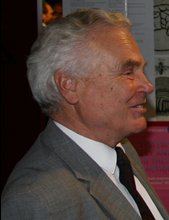In Memory of Erhard Kirsch
Dr. Erhard Kirsch, former scientist at the Max Planck Institute for Solar System Research, passed away on 12 September, 2023 at the age of 89.

Erhard Kirsch studied physics at the University in Heidelberg 1953-1959 (Dipl. Physik) and got his PhD at the University of Göttingen in 1964.
He joined the Max-Planck-Institut für Stratosphärenphysik in 1966 (which became the Max-Planck-Institut für Aeronomie (MPAe) and later the Max-Planck-Institut für Sonnensystemforschung (MPS)) and retired in 1999.
He was interested in many topics of space physics from aurora to radiation belts and from the solar wind and acceleration processes in interplanetary shocks to the moon, comets, Mars, Jupiter, and Saturn.
He published more than 100 articles between 1970 and 2011 on a whole variety of themes from the study of northern lights, variations of solar particle spectra, energetic particles in the vicinity of comets, x-rays and ENAs at Jupiter and Saturn to substorms at Earth, particle studies near Mars, and in the Saturnian magnetosphere.
Erhard Kirsch started his scientific career with the evaluation of proton measurements from AZUR, the first research satellite of Germany (1969). After AZUR, he was involved in experiments on the Explorer 35 and Explorer 41 probes. He was also interested in the acceleration processes of charged particles in the tail of the Earth's magnetosphere. Using data from GIOTTO and IMP 8, he also investigated shock acceleration mechanisms of protons. With the NASA satellites Geotail and WIND he succeeded in detecting pickup ions from the Moon and from comets in the Earth's magnetosphere. He then moved on and worked on Mars particle data of the Phobos-Mission where he studied different types of populations accelerated locally. Erhard Kirsch was alsothe first to detect energetic neutral particles near Saturn with an ion spectrometer onboard the Voyager spacecraft and was Co-Investigator on the Cassini/Huygens mission to Saturn and Titan.Even after his retirement in 1999 he frequently visited the institute and discussed new data from that mission before and after Cassini arrived at Saturn in 2004.
He was always open to new ideas, and in his last professional years was involved in a proposal for collecting dust in Earth orbit with aerogel stacks.
He will be remembered as a very quiet and trustworthy scientist and colleague. He will be greatly missed.
